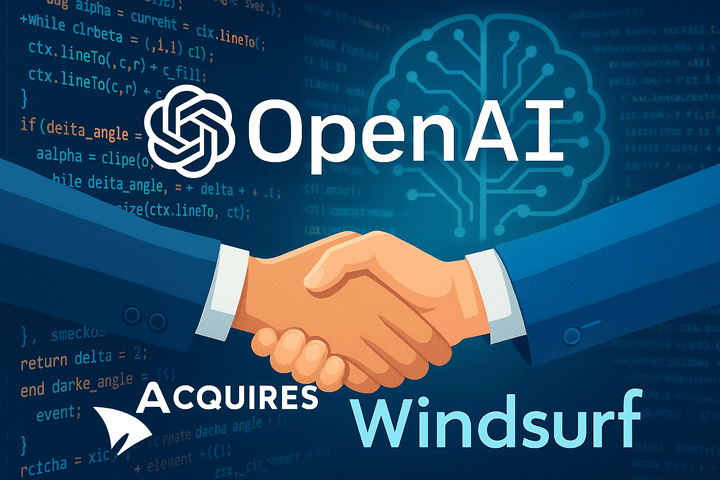OpenAI Acquires Windsurf: A $3 Billion Bet on AI Coding Tools

Table of Contents
Introduction
On May 6, 2025, OpenAI confirmed a deal to acquire Windsurf—an AI-assisted coding tool previously known as Codeium—for roughly $3 billion. If finalized, this will become OpenAI’s largest acquisition to date, signaling the organization’s commitment to bolstering its developer ecosystem. The agreement, first reported by Bloomberg and Reuters, remains subject to customary closing conditions and approvals.
Acquisition Details
OpenAI has agreed to pay approximately $3 billion in cash and stock to bring Windsurf into its fold. The negotiations followed Windsurf’s recent fundraising talks at a $3 billion valuation with investors such as General Catalyst and Kleiner Perkins. Windsurf’s last major funding round, in August 2024, raised $150 million at a $1.25 billion valuation, led by General Catalyst. Both parties have declined further comment pending closing, which sources expect to occur by Q3 2025.
Background on Windsurf
Originally launched as Codeium in 2021, Windsurf gained traction by integrating seamless code generation and completion directly into popular IDEs. Its platform supports multiple programming languages and offers real-time collaboration features. The startup attracted significant venture backing early on, with firms like Greenoaks and Kleiner Perkins betting on its promise to accelerate developer productivity through AI.
Strategic Rationale
This acquisition aligns with OpenAI’s broader vision of embedding advanced AI capabilities across the software development lifecycle. By integrating Windsurf’s technology into ChatGPT and other OpenAI offerings, developers can expect:
- Enhanced Code Generation: More accurate, context-aware code snippets and refactorings.
- Seamless IDE Integration: Native support for popular editors, reducing friction in developer workflows.
- Unified AI Ecosystem: Centralized tooling that leverages OpenAI’s language models alongside specialized coding assistants.
In the competitive landscape—where GitHub Copilot, Amazon CodeWhisperer, and Google’s AI coding tools vie for mindshare—this move cements OpenAI’s leadership in AI-driven development.
Industry & Expert Reactions
Analysts view the deal as a strategic land grab for developer loyalty and data. “Windsurf’s user base generates invaluable training data,” notes an AI industry consultant. From my perspective, acquiring Windsurf not only strengthens OpenAI’s product suite but also secures a direct channel to the day-to-day practices of software engineers. This will likely inform future model improvements and foster tighter integration between AI assistants and coding workflows.
Implications for Developers & Competition
For developers, the acquisition promises a more cohesive experience: imagine drafting a pull request in ChatGPT, debugging with Windsurf suggestions, and deploying—all within a unified interface. However, concerns around vendor lock-in and data privacy are bound to surface. Competitors may respond with deeper partnerships or accelerated feature rollouts of their own AI coding assistants to retain users.
Regulatory & Market Considerations
At $3 billion, regulators will scrutinize the deal for potential antitrust implications, especially given OpenAI’s growing influence. While the acquisition is aimed at enhancing tools rather than consolidating content, close attention from competition authorities in the U.S. and EU seems inevitable. Market dynamics in AI development platforms are rapidly evolving, and this move could spark further consolidation.
What’s Next
Assuming a smooth closing in the coming months, OpenAI plans to:
- Integrate Windsurf into ChatGPT Pro: Offering an all-in-one experience for coding tasks.
- Launch a Unified Developer Suite: Bundling model access, code generation, and collaboration tools under a single subscription.
- Expand Training Data Pipelines: Leverage Windsurf usage logs—respecting privacy norms—to fine-tune specialized coding models.
Developers and enterprises should watch for early beta releases in late 2025, with a general rollout expected by early 2026.
Conclusion
OpenAI’s acquisition of Windsurf marks a bold leap toward controlling the AI coding ecosystem end-to-end. By marrying Windsurf’s IDE integrations with OpenAI’s cutting-edge language models, the company is positioning itself at the intersection of AI research and practical software engineering. Personally, I believe this deal will accelerate AI adoption in development teams, though it also raises important questions about choice, data governance, and competitive balance in the AI tooling market.
References
- Reuters: OpenAI agrees to buy Windsurf for about $3 billion
- Bloomberg: OpenAI Reaches Agreement to Buy Startup Windsurf for $3 Billion
- DevOps.com: OpenAI Acquires Windsurf for $3 Billion
- Economic Times: OpenAI Reaches Agreement to Buy Startup Windsurf for $3 Billion
- Axios Pro Rata: AI land grab newsletter